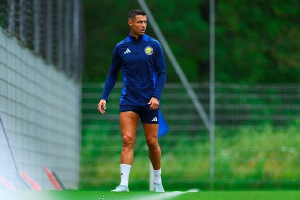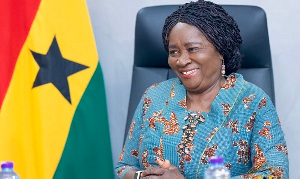Opinions of Tuesday, 5 February 2008
Columnist: Akosah-Sarpong, Kofi
Rawlings Meditations on Africa?s Democracy
If anybody in Ghana or Africa should ponder deeply and critically on the direction or how to grow a more sustainable democracy in Africa that reflects Africa?s histories, experiences, cultural traditions and norms, that person, perhaps, should be former Ghanaian President, Flt. Lt (rtd) Jerry Rawlings.
At 32 years old, Rawlings was embroiled in the turbulent Ghanaian politics that saw him not nearly being executed but also being part of the most violent era of Ghana?s history ? in 1979 (June to September) junior officers, who made Rawlings their leader, staged an ?uprising? and later ?military housecleaning? that saw the consequent executions of former military junta Heads of State - Gen. Akwasi Afrifa of the National Liberation Council; Gen. Kutu Acheampong and some of his associates of the National Redemption Council; and Gen. F. W. Akuffo and other leading members of the Supreme Military Council. That?s a big experience for a young man to go through but Rawlings swam through all the same, seeing him rule Ghana for almost 20 years. Despite his rough start, particularly in grasping the nuances of the Ghanaian political culture, Rawlings revealed his current insight about Ghana?s and Africa?s democratic challenges in Abuja, Nigeria at the 5th Annual Trust Dialogue, organized by Media Trust Ltd. publishers of the Daily Trust. In a country which democracy is heavily struggling, sometimes confusing, Nigeria was instructive in Rawlings? analysis of Africa?s democracy - both personally and continentally. ?To understand the present you have to understand past,? as the Chinese say. Rawlings? ability to diagnose Africa?s democracy from within African traditional values also informs his past ? his ability to weather through a Ghana which earlier democratic practices had been in tatters, its elites incomprehensible, and confused of how to grow democracy from within Ghana?s innate traditions and norms.Rawlings? Nigerian lecture also reveals how African elites have not been able to mix their traditional democratic ideals with their ex-colonial and the global democratic practices. What is terribly telling here is a Jerry Rawlings who ruled Ghana for almost 20 years but couldn?t radiate the fact that either democracy or African governance should reflect African traditional characteristics but now upon reflections able to see the light like the Biblical Saul.
After eight years of being a democratic civilian President, Rawlings is now wiser and much more developed, more reflective, and holistic ? that Africa?s traditional democratic characteristics should be mixed with the global democratic ideals. Wisdom and insights in all forms of human endervour do not come easily. That?s why Rawlings, after 20 years rule as military ruler and civilian President, and armed with more sense of clarity today at 60 years old, ?punctured the argument that African nations must submit to orders from the West to actualize their quest for good governance.?
And no country in Africa, despite Ghana?s description as the ?Black Star of Africa,? reveals a democracy that is to flow from African traditional characteristics than Nigeria, Africa?s most populous country, ?to help? Africa roll out ?a viable democratic practice? from within African traditional values that will make most of the desperate ethnic groups feel at home within the container of the colonially-created nation-states. Either by the colonialists or lazy African elites over for the past 50 years, the average African and the world-at-large thought Africans have no drop of traditional democratic ideals that should be mixed with the global ones for sustainable African democracy as other ex-colonies have done.
This has made many the world over to think, wrongly, that Africa has no traditional democratic ideals, particularly so African elites? behaviour over the years as the on-going Kenyan democratic debacle shows. It is in this sense that Rawlings faulted ?claims that democratic governance was alien to Africa? and argued brilliantly ?that majority of the pre-colonial systems of traditional governance in Africa had democratic elements.? From his experiences, Rawlings views on African democracy aren?t academic but practical, bordering on Africa?s progress.
After years of drawing from the Ghanaian environment, and its backyard such as Cote d?Ivoire, Guinea Bissau, Guinea Conakry, Togo, Sierra Leone and Liberia, Rawlings rejects the claim that Africans have no iota of indigenous democratic ideals. Africans have, but, intellectually and conceptually lazy, have not appropriated them. Rawlings clarifies this by arguing that it ?was wrong for the developing countries to conclude that democracy could only be defined by Western standards? developed nations were under the notion that African countries depended solely on them to solve socio-political and economic problems.?
More appropriately, the challenge is how African elites, including Rawlings and his associates, tell the ignorant world that Africa has well tested and tried innate traditional democratic characteristics that should be mixed with the global democratic ideals, as Botswana and countries in Southeast Asian countries have done, for more stable democracy.
In retrospect, Rawlings meditations on African democracy, informed by African traditional values, may reveal some regrets on his past as a former military head of state and democratic civilian president for not doing enough to root Ghanaian democracy in Ghanaian traditional practices as the Botswanans have done. Rawlings had all the powers, for almost 20 years, to have midwifed a new Ghanaian democracy authentically reflective of Ghanaian traditional ideals as Botswana and most of the countries in Southeast Asia have done.
By undertaking such major project, Rawlings would have bravely mixed the sleepy informal traditional sector with the hugely awakened formal ex-colonial neo-liberal Western orthodox sector that would have brilliantly opened up the vast informal sector for fuller progress and give better sense of progress for the average Ghanaian to understand. In a sense, the average Ghanaian would have critically owned Ghana?s democracy in the sense of dispersal of democratic values at all corners of Ghana driven by their traditional values and norms, and not some few Western-minded elites.
The reason for such failure isn?t farfetched: Rawlings, like most other leaders before him, didn?t understand Ghana deeply enough from within its foundational traditional roots ? the reason may range from the nature of the heavily Western values oriented education system that demean African traditional ideals to weak sense of African values that wheel in the public domain. It is, therefore, not surprising that from 1979 onwards Rawlings dabbled in Socialism, sometimes Marxism, and then back to Socialism, then faced with acute challenges of an international development system dominated by neo-liberal capitalist system, shifted to the free market capitalist enterprise, then to Social Democracy as his National Democratic Congress party touts as its political ideology.
In all these political and policy meandering, Rawlings and his associates couldn?t ground any of the foreign political philosophies in Africa?s traditional values as deeply and openly and critically as possible despite their good attempts at decentralization. It is Rawlings? inability to mix traditional African values with the global democratic ideals that has resulted?...in the rather arrogant and erroneous claim, which seeks to deny the African originality or any organizational ability in the matter of governance,? as he told his Nigerian audience.
Rawlings? failure to grasp and implement African traditional democratic characteristics, as fellow African, Botswana has done, has resulted in a situation where, ?They (the Western world) have, therefore, concluded that unless African countries accept Western ideas of democracy, especially as formulated on the conditionality of donor countries and international financial institutions, the future of Africa is bound to be bleak.? While part of Africa?s weaknesses may be lack of appropriation of its traditional values, it doesn?t matter whether Nigeria is ?the only developing country that is not vulnerable to manipulation by the Western world,? as Rawlings said.
Nigeria, like Ghana, is yet to demonstrate that its emerging democracy is reflective of its traditional values and norms that will bring peaceful development to it?s over 250 ethnic groups who are longing for democracy that reflects their innate souls. The Rawlings Abuja lecture reveals a continent coming to terms with itself ? not only its democratic ideals grown in its long-suppressed traditional values but also its whole development processes.















